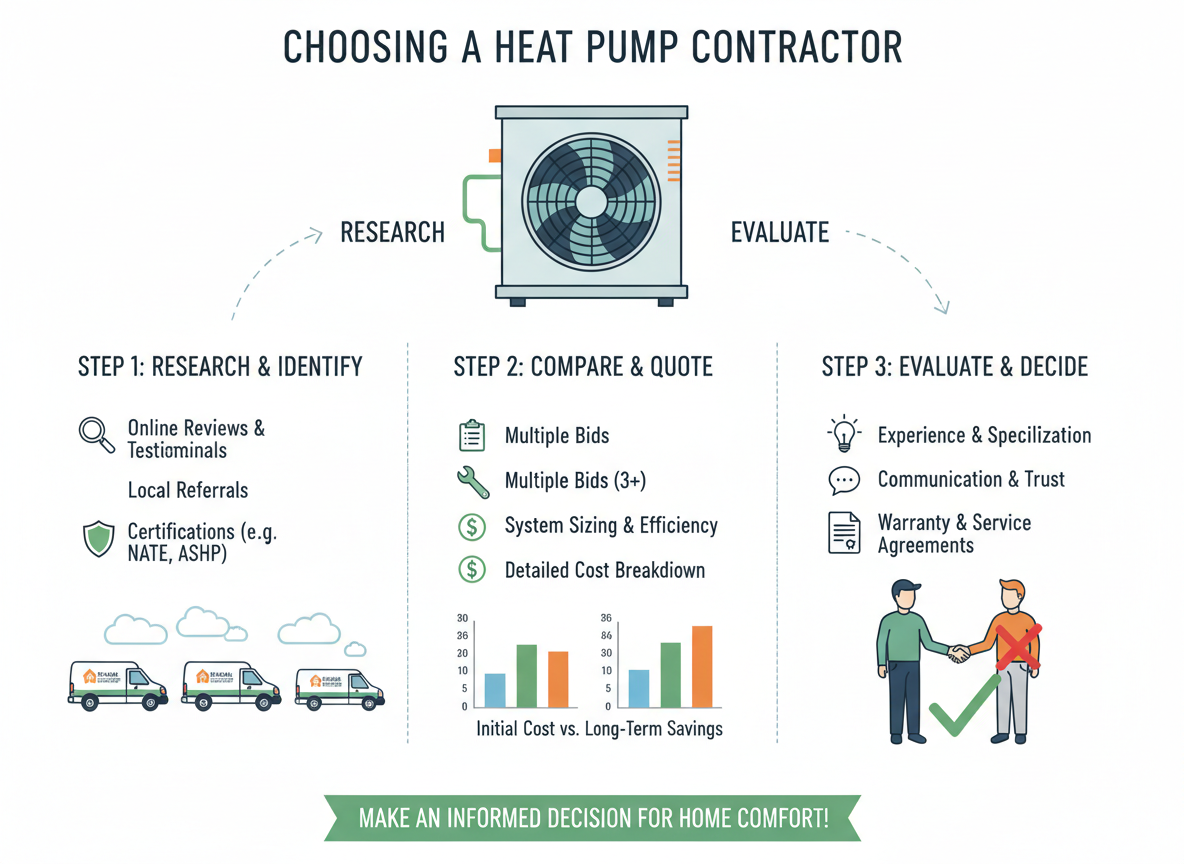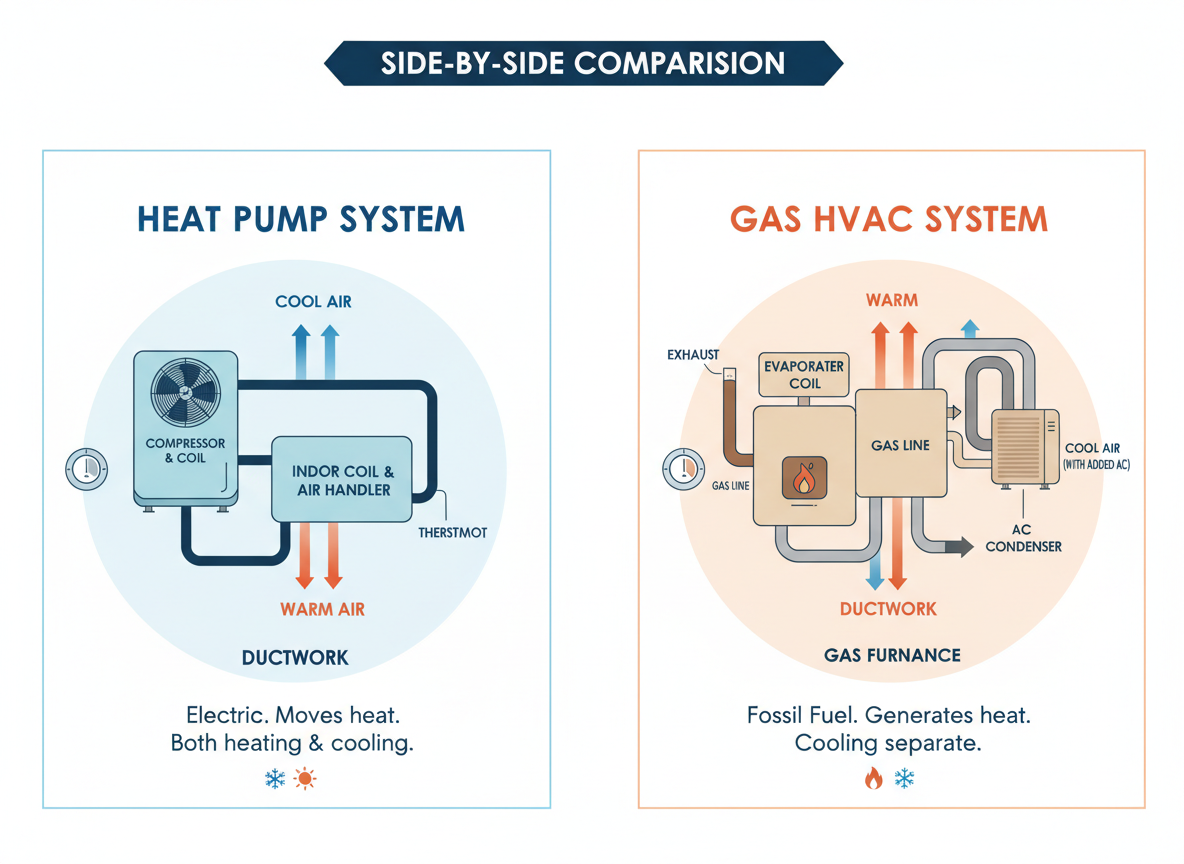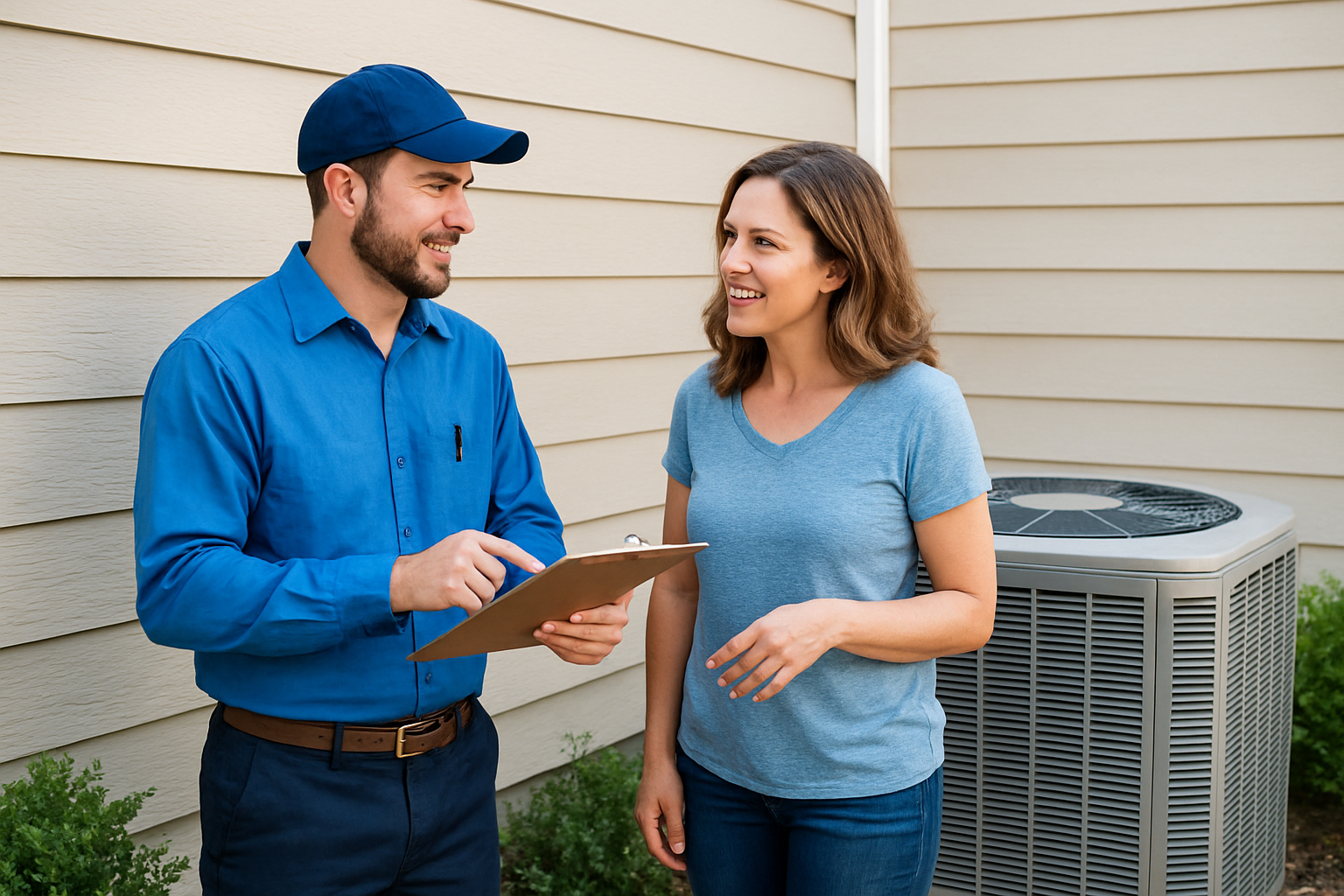
When your AC won't turn on, it's a frustrating problem, but don't panic. A simple solution might be all it needs. Your first step is to check the circuit breaker for your AC unit; sometimes, a quick reset is all that's required. However, if that doesn't work, the issue is likely more serious. A completely unresponsive AC can be a sign of a faulty thermostat or a critical component like a failed motor.
Unlike minor fixes, these problems can be dangerous to work on and should never be attempted on your own. Instead of having to look for AC repair near me, schedule your service call online or call us today and one of our certified technicians can quickly identify the source of the problem and perform the necessary repairs to restore your comfort and peace of mind.

This common but frustrating issue typically indicates a critical system failure, such as a refrigerant leak, a frozen evaporator coil, or a malfunctioning compressor. These are complex mechanical and chemical problems that are unsafe and impractical for a homeowner to address on their own. Instead of struggling with the discomfort and potential for further damage, the smartest and safest course of action is to contact a professional for AC Repair Services near me.
A certified technician has the tools and expertise to accurately diagnose the root cause of your AC blowing hot air and perform the necessary AC Repair. Our team is equipped to handle these emergencies, ensuring your comfort is restored quickly and efficiently, with a focus on long-term solutions, not just temporary fixes.

The puddle on your floor or the water stains on your ceiling are more than just a nuisance. A quick check to possibly solve the issue is checking if the drain line is properly connected to the ac unit and still fully intact, but an AC leaking water can signal a serious problem, such as a clogged condensate drain line, a frozen evaporator coil, or a faulty drain pan.
Ignoring the issue can lead to costly water damage and mold growth in your home. Instead of risking a DIY fix that could cause more harm, instead of trying to find an AC repair near me, schedule a service call with us online or give us a call and our experienced technicians can quickly diagnose the cause of the AC unit leaking water and provide a lasting solution to protect your home and restore your system's function.

When your air conditioner begins making loud or weird noises, it's a signal that something is possibly very wrong and requires immediate ac repair, but here is something you could check first. Check and make sure that all screws are tight and all panels are tightly secured to the unit, due to the constant motion of the unit these loose pieces can cause loud / weird noises.
Sounds like grinding, clanking, or squealing are not normal and often indicate a more serious mechanical issue, such as a loose fan belt, a failing motor, or a broken part within the compressor. For a professional diagnosis and a reliable fix, your best course of action is to have quality hvac contractor perform a ac repair to inspect your unit.
Taking quick action can save you from an emergency situation and ensure your system continues to run smoothly. Schedule online or give us a call today!
.jpg)
When your air conditioner fails to cool your home, it's a frustrating and urgent problem, especially during the hottest months. AC Not Cooling is the most common reason people call for service, as it's an immediate indicator that something can be wrong with your system.
A helpful tip would be checking and replacing your filter about every 6 months, this alone can possibly fix the problem as a dirty filter does not allow air to pass, but a clogged drain line, a refrigerant leak, disconnected duct, or a failed capacitor are just some of the reasons that the ac is not cooling.
While some homeowners might be tempted to troubleshoot on their own, a professional AC Repair is often necessary to correctly diagnose and fix the root cause. We have certified technicians that are ready and equipped to not only diagnose the problem on the spot, but also has the parts ready to fix the AC unit same day. Schedule your AC repair service call online or give us a call today!
Navigating AC repair in the expansive Los Angeles area requires a specialized approach, particularly when serving the unique demands of the San Fernando Valley. Residential needs often center on rapid, non-invasive fixes for issues like refrigerant leaks or failed capacitors to restore home comfort quickly. Conversely, commercial AC repair in areas like Woodland Hills, Northridge, and Encino involves complex, detailed requirements: a repair job isn't just about restoring cold air, but ensuring compliance with building codes and minimizing business disruption.
Our technicians are trained to manage these varying scales, from diagnosing small, residential duct issues to tackling urgent commercial system failures that demand specific, detailed attention to industrial-grade components and minimizing operational down time. Schedule a service call today!
Dirty air filter, clogged condensate drain line, mechanical issues, low refrigerant or an outdated ac unit are all common reasons for why your ac unit is blowing warm air. These issues are the most common issues we get during the hot summer months. Possible reasons your AC isn't working.
If your ac unit is not running, first check the circuit breaker. Try to reset the breaker and see if that solves the issue. A clogged air filter can slow down or completely block air flow, try to replace the air filter to see if that helps the issue. It is recommended to replace the air filters at least once every 6 months.
Make sure the thermostat temperature is set to a lower temperature that what the temperature is in your home. If your ac is still not working after a few simple checks, contact your local HVAC company near you to schedule an ac repair service call. Common reasons for AC issues.
Getting quick AC repair is a top priority when the Los Angeles heat hits. To get the fastest service, first, check your thermostat and filter to rule out simple fixes. If the problem persists, our team is standing by to help. The quickest way to get a technician to your door is to call us directly.
Our dispatch team can provide an immediate estimate of a technician's arrival time, often within the same day. For even faster service during peak summer months, our maintenance plan members get priority scheduling, ensuring you're never left waiting. When you need immediate AC service near y, we’re just a phone call away. Contact Us Today!
If you tend to neglect periodic maintenance of your HVAC system then you might end up paying a lot more for ac repairs. To save money and keep your HVAC system running like it should it’s important to take preventive steps to avoid major ac issues or a complete breakdown of the system. How to save money on AC repairs.
Leaks or damage in your home's air ducts can cause a significant loss of conditioned air—sometimes as much as 30%—before it even reaches your living spaces. The condition of the ductwork is a key factor that influences how your air conditioner's performance. This forces your system to run longer and work harder, leading to higher energy bills and increased wear and tear on components.
Beyond energy waste, compromised ductwork can also introduce dust, allergens, and other pollutants into your home, negatively impacting your indoor air quality. A professional inspection can easily identify these issues, and sealing or repairing your ducts can dramatically improve both your system’s efficiency and the health of your home’s air.
Maintaining climate control for a business is a unique challenge that goes far beyond the needs of a residential home. A single, small malfunction in a commercial system can affect an entire office floor, compromise a data center, or spoil sensitive inventory. As a leading commercial HVAC company near me, we understand that downtime is not an option. Our expertise is rooted in a proactive approach to commercial AC repairs.
We don't just fix a problem; we diagnose the underlying cause, whether it's a minor electrical issue or a significant component failure. This meticulous attention to detail allows us to not only provide a swift repair but also to recommend solutions such as a commercial hvac maintenance that will help prevent future breakdowns, ensuring your business environment remains comfortable and operational without interruption.
As a proud local ac company located in the San Fernando Valley, we at LA Heating and Air believe no AC repair is too small, and it’s never too early to call for help. Our experienced technicians have the skills and knowledge to keep your home comfortable and your family safe all year long. If your AC isn’t running the way it should, let us take the stress off your shoulders. Call us today at (818) 660-1062 or schedule your AC repair online and get your comfort back fast!



This guide explains how heat pump installation works in Los Angeles and what homeowners should look for when choosing a contractor. It covers installation requirements, common mistakes, certification and permit considerations, pricing factors, and how to avoid issues that affect comfort, rebates, and long-term performance—so you can make an informed decision before installing a heat pump.

If you’re considering a heat pump in California, this post explains one critical requirement most HVAC companies leave out: TECH certification. You’ll learn why the state requires TECH-certified contractors for rebates, how certification affects install quality and system performance, and what can go wrong if you choose the wrong installer. It also shows how TECH compliance protects you from denied rebates, poor airflow, and systems that can’t keep up with LA heat—so you can make a confident, informed decision before you install.
.png)
Learn how the HVAC $5,000 Rule helps you decide whether AC repair or replacement makes financial sense. Simple formula, expert guidance for LA homeowners.

Explore the costs and savings of installing a heat pump in your Los Angeles home. Discover average installation costs, benefits,

Los Angeles homeowners can save thousands on heat pump installations with rebates from LADWP, federal tax credits, and incentives from TECH Clean California. Learn how these programs can dramatically lower your upfront costs, boost home efficiency, and contribute to a greener future.

Choosing a new HVAC system is a significant investment that requires careful consideration of your specific needs, from the size of your space to your budget and energy efficiency goals. The key to a successful project is not only selecting the right system type and features but also hiring a qualified, professional contractor in Los Angeles for proper and safe installation.